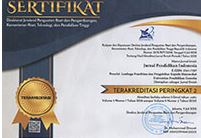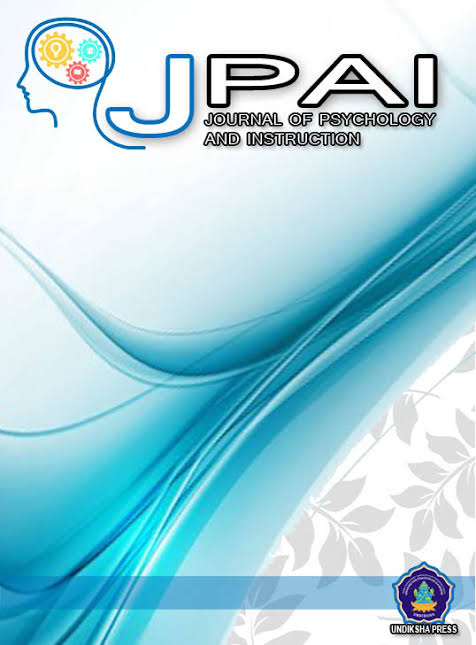DIGITAL LITERACY AND STUDENT ACADEMIC PERFORMANCE IN UNIVERSITIES: A META-ANALYSIS
Kata Kunci:
Academic Performance, Digital Literacy, College Students, Meta-AnalysisAbstrak
The development of Information and Communication Technology in the world, especially the internet, demands its use in the field of Education, in this case students at the university level are required to use blended learning methods so that they must have the skills and skills to use digital technology or digital literacy skills in lectures to support good academic performance. Previous research has shown a correlation between digital literacy and academic performance, but no research has focused on how much influence the r and size of the correlation of the two special variables have on students at the university level. This meta-analysis aims to measure the relationship between digital literacy and student academic performance at the university level by considering the effect size. The total sample in this study was 4105 students from 15 studies that were considered eligible. The results of the meta-analysis show that digital literacy has a positive and significant correlation to student academic performance at the moderate level with a 95% CI (0.184; 0.444). The heterogeneity test showed good results and there was no publication bias.
Referensi
Abbas, Q., Hussain, S., & Rasool, S. (2019). Digital Literacy Effect on the Academic Performance of Students at Higher Education Level in Pakistan. Global Social Sciences Review, IV(I), 108-116. https://doi.org/10.31703/gssr.2019(IV-I).14
Aboderin, O.S., & Govender, D.W. (2023). Predictors of academic performance of distance e-learners in a Nigerian university. Research in Business & Social Science IJRBS, 12 (1), 296-307. https://doi.org/10.20525/ijrbs.v12i1.2296
Avci, U., & Ergun, E. (2019). Online students’ LMS activities and their effect on engagement, information literacy and academic performance. Interactive Learning Environments, 1-14. https://doi.org/10.1080/10494820.2019.1636088
Azizi, E. (2014). Relationship between Internet Competency and Academic Achievement of Science Students in Bachelor Level. Research Journal of Recent Sciences, 3(9), 34-38.
Banik, P., & Kumar, B. (2019). Impact of Information Literacy Skill on Students’ Academic Performance in Bangladesh. International Journal of European Studies, 3(1), 27-33. https://10.11648/j.ijes.20190301.15
Barlow-Jones, G., & Westhuizen, D. V. D. (2011). Situating the student: factors contributing to success in an Information Technology course. Educational studies, 37(3), 303-320. https://10.1080/03055698.2010.506329
Cohen, J. (1988). Statistical power analysis for the behavioral sciences (second edition). Hillsdale: Lawrence Erlbaum Associates, Publishers
Darlis, V., & Sari, D.K. (2020). The Effectiveness of Blended Learning: The Impact of Student’s Characteristics and Digital Literacy on Student Performance. Advances in Social Science, Education and Humanities Research, 506. 561-566
Falode, O.C., Gambari, A.I., Alabi., Omotayo, T., & Falode, M.E. (2017). Relationship Between Students’ Ict Background Exposure, Access To Ict Learning Facilities And Academic Achievement In Undergraduate Educational Technology Programme. International journal for innovative technology integration in education, 127-134
*Flierl, M., Bonem, E., Maybee., C., & Fundator, R. (2018). Information literacy supporting student motivation and performance: Course-level analyses. Library and Information Science Research, 40 (2018) 30–37. https://doi.org/10.1016/j.lisr.2018.03.001
Guney, Y. (2009). Exogenous and Endogenous Factors Influencing Students’ Performance in Undergraduate Accounting Modules. Accounting Education: an international journal, 18(1), 51–73. https://doi.org/10.1080/09639280701740142
Kemp, S. 2022. Digital 2022: Motivations For Using The Internet. Datareportal.com. retrived on 31/8/2023. https://datareportal.com/reports/digital-2022-motivations-for-using-the-internet
Khan, N., Sarwar, A., Chen, T.B., & Khan, S. (2022). Connecting Digital Literacy In Higher Education To The 21st Century Workforce. Knowledge Management & E-Learning, 14(1), 46–61. https://doi.org/10.34105/j.kmel.2022.14.004
Lee, D., Sunnie L.W., & William R.W. (2020). The Relationships Between Self-Efficacy, Task Value, and Self-Regulated Learning Strategies in Massive Open Online Courses. International Review of Research in Open and Distributed Learning, 21 (1). 23 – 29
Limniou, M., Varga-Atkins, T., Hands, C., &Elshamaa, M. (2021). Learning, Student Digital Capabilities and Academic Performance over the COVID-19 Pandemic. Education Sciences. 2021, 11, 361. https://doi.org/10.3390/educsci11070361
Munawaroh., Fitriati, R., & Febriantina, S. (2022). Self-Confidence, Learning Motivation and Students Achievement: The Mediating Role of Digital Literacy. Jurnal Pendidikan Bisnis dan Manajemen, 8(1), 16-24. http://dx.doi.org/10.17977/um003v8i12022p016
Nanayakkara, P.M., Peiris H.M. Ranathunga, R.A.N., & Muthuthanmy, M.M. (2020). Effectiveness of Introductory Information and Communication Technology Module and its Implication on Academic Performance: A Study on Medical Entrants. 17th International Conference on Business Management, vol. 17, 740-751. https://doi.org/10.31357/icbm.v17.5170
Naomi, P., & Nindyati A.D. (2010). Faktor-Faktor Individu Yang Mempengaruhi Kinerja Akademik Mahasiswa ( Pada Mahasiswa Universitas Paramadina Angkatan 2008). Equilibrium, Jurnal Ekonomi-Manajemen-Akuntansi. 8(1), 21-37. http://dx.doi.org/10.30742/equilibrium.v8i1.300
Naz, F.L., Raheem, A., Khan, F.U., & Muhammad, W. (2022). An Effect Of Digital Literacy On The Academic Performance Of University-Level Students. Journal of Positive School Psychology, 6(8), 10720-10732. https://journalppw.com/index.php/jpsp/article/view/15014
Ng, Wan. 2012. Can we teach digital natives digital literacy?. Computers & Education 59 (2012), 1065–1078. https://10.1016/j.compedu.2012.04.016
O’Connor, M.C., & Sampo V. P. (2007). Big Five Personality Predictors Of Post-Secondary Academic Performance. Personality and Individual Differences 43 (2007), 971–990. https://10.1016/j.paid.2007.03.017
Page, M. J., McKenzie, J. E., Bossuyt, P. M., Boutron, I., ….., & Moher, D. (2021). The PRISMA 2020 statement: An updated guideline for reporting systematic reviews. BMJ, 372, n71. http://dx.doi.org/10.1136/bmj.n71
Rothstein, H. R., Sutton, A. J., & Borenstein, M. (Eds.). (2005). Publication bias in meta analysis: Prevention, assessment and adjustments. Sussex, England: Wile
Sari, D.M.M. (2022). Digital Literacy and Academic Performance of Students’ Self-Directed Learning Readiness. ELite Journal : International Journal of Education, Language, and Literature, 2(3), 127-136. https://doi.org/10.26740/elitejournal.v2n3.p127-136
Silalahi, D.E. 2022. Literasi Digital Berbasis Pendidikan: Teori, Praktek Dan Penerapannya. Sumatera Barat: PT. Global Eksekutif Teknologi
Sukmawati, Ade Irma dkk. 2019. Seri Literasi Digital: Demokrasi Damai Era Digital. Jakarta: Siberkreasi
Tang, Chun Meng & Lee Yen Chaw. 2016. “Digital Literacy: A Prerequisite for Effective Learning in a Blended Learning Environment?. The Electronic Journal of e‐Learning, 14(1), 54‐65. https://files.eric.ed.gov/fulltext/EJ1099109.pdf
Thamrin., Aditia, T., & Hutasuhut, S. (2023) Key Factors to Foster Academic Performance in Online Learning Environment: Evidence From Indonesia During COVID-19 Pandemic. Cogent Education, 10(1), 1-23. https://doi.org/10.1080/2331186X.2023.2174726
Tomas, J.M.. Guterrez, M., & Georgieva, S. (2019). The effects of self‐efficacy, hope, and engagement on the academic achievement of secondary education in the Dominican Republic. Psychol Schs. 2019;1–13. https://10.1002/pits.22321
Ukwoma, S.C. & Nkiruka E. Iwundu. 2016. Digital literacy skills possessed by students of UNN, implications for effective learning and performance A study of the MTN Universities Connect Library. New Library World 117(11/12), pp. 702-720. https://10.1108/NLW-08-2016-0061










